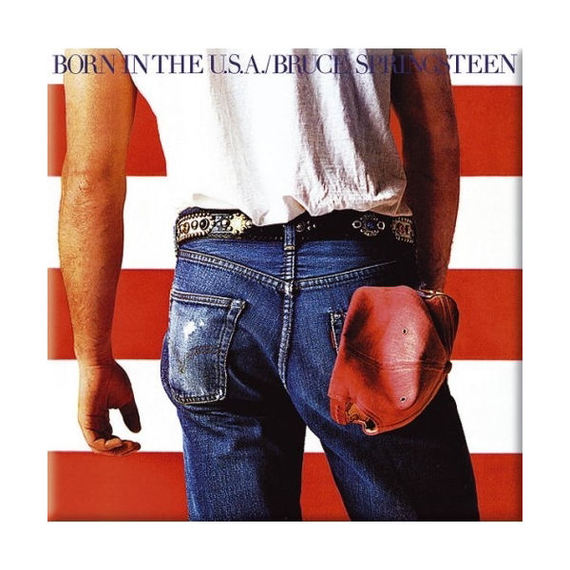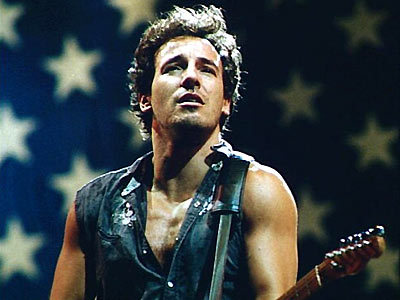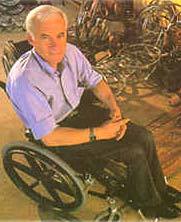The red, white, and blue summer of 1984 found me underemployed, disillusioned, and struggling to survive as a stay-at-home dad. The love and support of my wife and four year-old daughter notwithstanding, I'm not sure I would have made it through that summer, or that year, had it not been for Born in the USA, the new album from Bruce Springsteen and the E Street Band.
Released a month before the Olympics convened in Los Angeles, the album became the soundtrack to my life that summer and, in ways both subtle and obvious, made me feel better about being a Vietnam veteran -- and an American.
That's a strange road to travel, but it's the one I was on, and, in some way, the one I think that Bruce was on too. Like the rest of us Vietnam generation males, Bruce Springsteen was haunted by Vietnam. He'd lost a good friend to the war (drummer Bart Hanes) and, as a community college dropout, was primed to be drafted. The only thing that "saved" him from the military was an old motorcycle injury that helped get him a physical deferment.
But that too was a mixed bag, because Bruce knew that his being deferred meant someone else would be drafted in his place, someone who might never make it back home. Which may help to explain why he remarked, "Ain't nothin' to be proud of," in response to a crowd cheering when it learned of his escape from the draft.
And it also might help explain some of the anger and despair and frustration Vietnam vets like me hear in the album's title song "Born in the USA." And maybe even how Bruce wrote the song in the first place!
Three years earlier -- on August 20, 1981 -- Bruce had uncharacteristically addressed an audience at the Los Angeles Arena. "Listen, listen for a second," Springsteen began in a serious voice with a hint of nervous tremor. "Tonight we're here for the men and the women that fought the Vietnam War. And, yesterday, yesterday I was lucky enough to have met some of these guys and it was funny because I'm used to coming out in front of a lot of people and I realized that, that I was, I was nervous and I was a little embarrassed about not knowing what to say to 'em."
The emotion in Springsteen's voice was obvious as he went on. "And it's like when you feel like you're walking down a dark street at night and out of the corner of your eyes you see somebody, you see somebody getting hurt or somebody getting hit in the dark alley but you keep walking on because you think it don't have nothing to do with you and you just wanna get home. Vietnam turned, turned this whole country into that dark street and unless we, unless we're able to walk down those dark alleys and look into the eyes of the men and the women that are down there and the things that happened, we're never gonna be able to get home and then it's only a chance."
A minute later, Springsteen turned to the wings and asked Bobby Muller to join him on stage. Confined to a wheel chair as a result of a bullet that punctured both lungs and his spine during an assault in Vietnam, Muller had gone from gung-ho Marine to anti-war activist and founder of Vietnam Veterans of America. Declaring the night of that LA concert "the first step in ending the silence that has surrounded Vietnam," Muller paid tribute to the more than 58,000 Americans killed and 300,000 wounded and the veteran advocates who had been fighting what all too often seemed like an endless series of losing bureaucratic battles.
That was a pivotal moment for Bruce Springsteen, and for the loosely connected community of Vietnam veterans as well. Not long after the evening, Springsteen called Muller and invited him to his studio where he played the ballad, "Shut Out the Light." Muller was moved. "Man, that was powerful," he recalls telling Bruce. And then Springsteen tells Muller "I got one more I want you to listen to" and plays "Born in the USA." When he finished, he looked at Muller and asked "Did I get it?' "Yeah, you got it!' came Bobby Muller's enthusiastic response.
Bruce got it all right, nailed it with the images of living in a dead man's town, of a veteran who's kicked, beat up and discarded. We handed a rifle to a generation of young men who sometimes were on the wrong side of the war, shipped them off to places like Khe Sanh and forgot about them. "Nowhere to run, ain't got nowhere to go." All of that, and more, is there in Born in the USA.
Which makes it all the more surprising that the song was so widely misunderstood by presidents and columnists and flag-wavers.
But not by me. I heard the resentment and frustration of my fellow Vietnam vets, felt their rage, and I knew Bruce Springsteen was there with us, for us. Thanks in part to him, I was proud to be a Vietnam veteran. And I was proud to be an American where artists like Bruce Springsteen could express sentiments like those in Born in the USA. Sentiments that were honest. Patriotic. American even.
Yes, now I could be "a cool rocking Daddy in the U.S.A." Thanks, Bruce!


